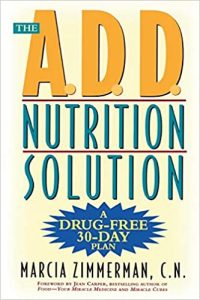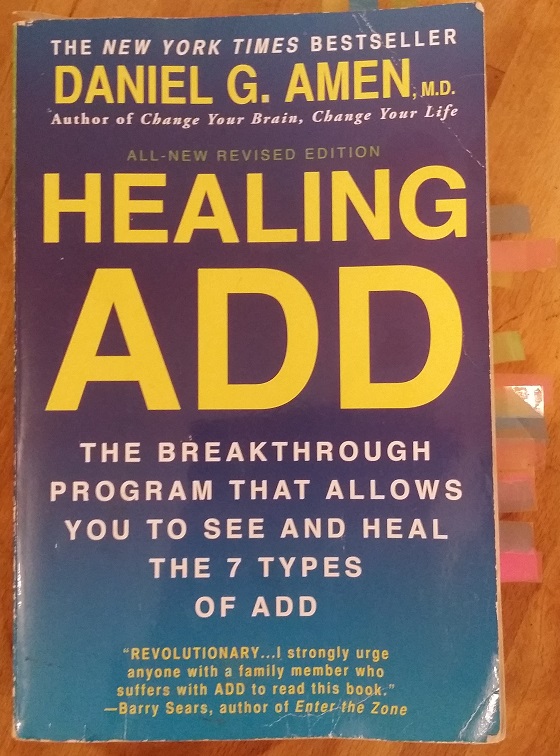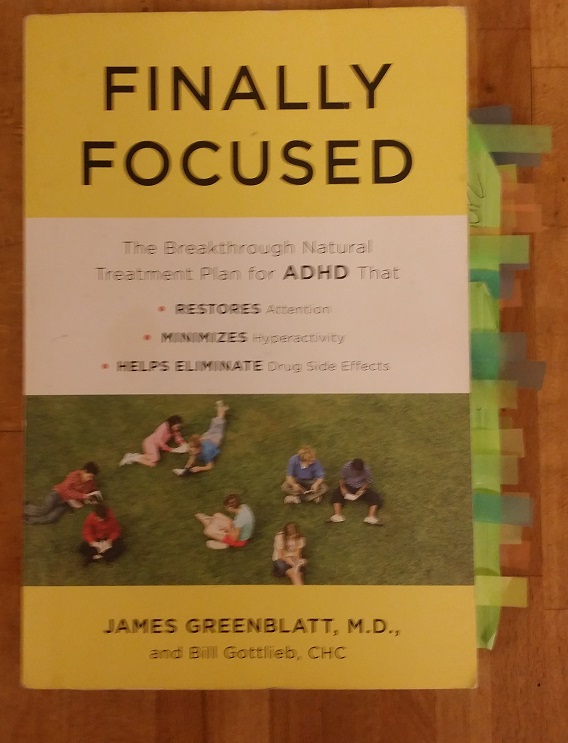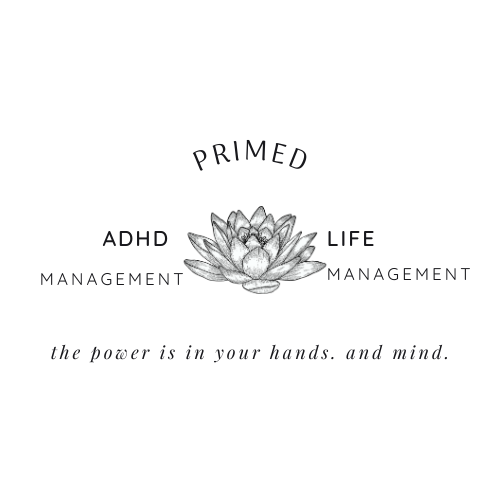When starting your journey of learning about ADHD, you probably head to the internet first, and books second. Here you are on the internet, and here are my ADHD book recommendations.
Below, I include three ADHD-specific books that have influenced me most plus some other influential books about brain health. There are several books about ADHD that I haven’t read but are on my reading list.
The book list below is in the order that I discovered and read them.
This is a long post, so jump to the following books as the titles grab you:
–The ADD Nutrition Solution
–HealingADD
–Finally Focused
–The UltraMind Solution
–Spark
ADHD book recommendations
The ADD Nutrition Solution
 The book The A.D.D. Nutrition Solution by Marcia Zimmerman (published in 1999) was suggested to me along with my ADHD recognition. 20 years later I’m still recommending that book to other people. This book changed my life. Two months into following the plan I noticed myself maintaining eye contact during an interview and thought, “Huh, I can maintain eye contact now.”
The book The A.D.D. Nutrition Solution by Marcia Zimmerman (published in 1999) was suggested to me along with my ADHD recognition. 20 years later I’m still recommending that book to other people. This book changed my life. Two months into following the plan I noticed myself maintaining eye contact during an interview and thought, “Huh, I can maintain eye contact now.”
The description from Amazon (slightly edited):
The first scientifically proven, effective, all-natural nutritional alternative to the much-prescribed drug Ritalin. Attention Deficit Disorder is a nutritional deficiency, not a psychological condition.
This is the revolutionary discovery Marcia Zimmerman made during her ten years of research as a nutritional biochemist. That conclusion led her to develop a diet that addresses the specific needs of the 17 million adults and children suffering from ADD. Her easy-to-follow thirty-day plan has been proven just as effective as Ritalin in relieving the symptoms of ADD.
Learn:
– How women should boost their nutrition before conception to prevent ADD in their newborn children.
– Why boys are much likelier to be tagged as ADD than girls
– How to get a reliable ADD diagnosis
– The effects of brain allergies on attention span
– Foods to avoid that may exacerbate ADD
– The dangers of artificial food ingredients
– and much more
This important book will help us curb the epidemic growth of ADD in this country and change the way we treat those who have it now by addressing its source instead of merely treating its symptoms.
From the back of the book:
“The A.D.D. Nutrition Solution provides groundbreaking information on the nutritional deficits, food allergies, and hereditary and environmental factors that can cause attention deficit/hyperactivity disorder (AD/HD), a condition that affects more than 17 million people in this country today.”
Before I learned of this book, every book about ADD that I found seemed to be written for parents with ADD-identified children. ADHD awareness came around 2000/2001.
You never forget your first
I used to recommend this book a lot. I loaned it to a couple of people – including a parent. However, I recommend it less frequently now because the books below came into my life. As I said up top, The A.D.D. Nutrition Solution changed my life. It introduced me to eating fat for brain health (before people were doing it for weight loss) as well as other nutritional protocols.
The A.D.D. Nutrition Solution came into my life when I needed it, and it changed my life.
Isn’t it great when that happens? It makes me feel warm and fuzzy to think that maybe sometimes I enter someone’s life when they need me.
I think that it’s always good to read the newer books (e.g. the third one on this list) regardless because new research happens and old research gets debunked.
Healing ADD (2013)

Full title: Healing ADD Revised Edition: The Breakthrough Program that Allows You to See and Heal the 7 Types of ADD
I love this book. That photo to the left is my copy, with its many bookmarks of pages that I might want to reference later. I found this book fascinating because it gets into the actual physical brain. It talks neuroscience, which has long been an interest of mine.
Healing ADD discusses different types of AD(H)D and how different areas of the brain are affected. If you had AD(H)D you’ll be able to identify which type you have and what’s going on in your brain – how different brain activity is causing symptoms.
The publisher’s description
Attention deficit disorder (ADD) is a national health crisis that continues to grow—yet it remains one of the most misunderstood and incorrectly treated illnesses today. Neuropsychiatrist Daniel G. Amen, MD was one of the first to identify that there are multiple types beyond just purely hyperactive or inattentive ADD, each requiring a different treatment. Now, in this all-new, revised edition, Dr. Amen again employs the latest medical advances in the field, including the largest brain imaging study ever completed on patients with ADD, to identify, examine, and demystify the 7 distinct types of ADD and their specific treatments.
With updated recommendations for nutraceuticals and/or medications targeted to brain type, diet, exercise, lifestyle interventions, cognitive reprogramming, parenting and educational strategies, neurofeedback, and more, Dr. Amen’s revolutionary approach provides a treatment program that can lead sufferers of ADD to a normal, peaceful, and fully functional life.
Sufferers from ADD often say, “The harder I try, the worse it gets.” Dr. Amen tells them, for the first time, why, and more importantly how to heal ADD.
Breaking it down
In Part 1 of the book, Dr. Amen presents symptoms of ADD and methodology for assessment, and he introduces the 7 types. Part 2 takes a deeper dive into those 7 types and offers case studies of people of all ages who Dr. Amen has helped. Many individuals assessed for ADHD after their grandchildren get help for symptoms. (ADHD can be hereditary.)
Part 3 discusses interventions that can help ADHD overall and presents strategies for each type of ADHD. Part 4 is about optimization, with the first two chapters about ADHD in children. There’s also a chapter in there about killing Automatic Negative Thoughts (ANTs), or as I’ve been calling them for years, “inner gremlins” (sometimes I call them my “inner assholes”).
Before there was a bandwagon…
It’s worth mentioning that his dietary protocol for 6 of the 7 types of ADHD calls for “higher protein, lower carb” with one of those mentioning “ketogenic diet”. I often point out the that keto diet was used for brain health long before it was embraced as a weight loss program.
Daniel Amen is a physician, neuroscientist, psychiatrist and a teacher. He is a ten-time New York Times best-selling author who has written over 30 books and authored or coauthored 70 professional articles. Dr. Amen is a Distinguished Fellow of the American Psychiatric Association. He is Founder of Amen Clinics. He and his wife Tana, host a podcast called The Brain Warrior’s Way. (Search for it wherever you listen to podcasts, be it iTunes, Stitcher or someplace else.)
Reading his books make me want to get a SPECT (brain) scan so that I can see inside my own brain and also to get a better sense of my type. Sometimes I think I have what Dr. Amen calls Classic ADD. Sometimes I think I have what he calls Limbic ADD because it includes symptoms of depression. Sometimes it feels like Anxious ADD.
Regardless, I try to be self-aware and adjust my life according to whatever symptoms arise. This approach is one of the ways I came up with the PRIMED System for ADHD Management, which I teach. (Contact me if you’d like to work with me.)
If you were to only read one book on this Top 3 list of ADHD book recommendations, I’d recommend this one because it’s so comprehensive.
Finally Focused
 (Finally Focused: The Breakthrough Natural Treatment Plan for ADHD That Restores Attention, Minimizes Hyperactivity, and Helps Eliminate Drug Side Effects)
(Finally Focused: The Breakthrough Natural Treatment Plan for ADHD That Restores Attention, Minimizes Hyperactivity, and Helps Eliminate Drug Side Effects)
[👈That’s not the best photo, but I’m using my old phone while I wait for a new one after losing my phone. The point of posting it is to show you all the tape flags and Post-It notes.]
The most recently published book on this list, Finally Focused by James Greenblatt, M.D. is for parents of children with ADHD and adults with ADHD, though somewhat more the former.
The book description:
Dr. James Greenblatt has seen thousands of children and adults struggling with the symptoms of ADHD – hyperactivity, inattentiveness, impulsiveness, and often irritability and combativeness. Rather than simply prescribing medication for their ADHD symptoms, he tailors remedies to his patients’ individual needs, detecting and treating the underlying causes of the disorder.
Finally Focused provides proven natural and medical methods to easily treat problems such as nutritional deficiencies or excesses, dysbiosis (a microbial imbalance inside the body), sleeping difficulties, and food allergies, all of which surprisingly can cause or worsen the symptoms of ADHD. Using Dr. Greenblatt’s effective Plus-Minus Healing Plan, parents will first understand the reasons behind their child’s symptoms, and then be able to eliminate them by addressing the child’s unique pattern of biological weakness. Adults with ADHD can do the same for themselves. And if conventional medication is still necessary, this integrative approach will minimize or even eliminate troublesome side effects. Using Dr. Greenblatt’s expert advice, millions of children and adults with ADHD finally will get the help they need to achieve true wellness.
This book helped me tweak my diet and supplements.
Brain health begins in the gut
Like Dr. Amen in his book, Greenblatt discusses the role of the gut in ADHD. There’s a section of Dr. Greenblatt’s book about candida overgrowth, which I have often experienced. I keep antifungal supplements on hand for candida outbreaks and take probiotics daily for overall health, increasing dosage when needed. Dr. Greenblatt also recommends eating low-carb, high protein. He talks neurotransmitters and their role in ADHD, which is crucial knowledge.
[If you want to read more about the brain-gut connection without leaving this website, I also wrote this seven months ago.]
As these authors agree, ADHD is not a Ritalin deficiency. It’s not an Adderall or Concerta deficiency. It’s also not a weakness nor laziness. There’s real stuff going on in your brain. If you have ADHD, you’re neurodivergent.
Overall, it is a very good book.
Those are my ADHD book recommendations.
Other books about brain health
The Ultramind Solution
The UltraMind Solution: The Simple Way to Defeat Depression, Overcome Anxiety, and Sharpen Your Mind by Mark Hyman (2010).
I got so much out of this book.
In The UltraMind Solution, Dr. Mark Hyman explains that to fix your broken brain, you must heal your body first. Through his simple six-week plan based on 7 “keys”, Dr. Hyman shows us how to correct imbalances caused by nutritional deficiencies, allergens, infections, toxins, and stress, restoring our health and gaining an UltraMind—one that’s highly focused, able to pay attention at will, has a strong memory, and leaves us feeling calm, confident, in control, and in good spirits.
I borrowed this one from the library last spring, and so I took lots of notes. It’s on my list of books to buy.
On Medication (mostly my own ramblings)
In the first chapter, Hyman cites a 2008 study in the New England Journal of Medicine that found that drug companies selectively published studies on antidepressants and withheld data to promote their own interests. Dr. Hyman believes in finding causes and cures, not merely covering symptoms.
I think that sometimes symptoms need to be addressed while the deeper work – work that might take longer to show results – happens. With symptoms under control (or “you” in control), it’s easier to cope with what’s going on and to make changes that don’t provide instant results. It helps to have quick relief so that we can deal and heal. If medication is the treatment of choice, it could be helpful to use it in conjunction with other therapies such as psychotherapy, exercise and nutritional therapy.
I believe that medication is a personal choice but that one must make an informed decision and be aware that there’s another way that doesn’t involve dependence, side effects, withdrawal symptoms and more.
We need to be empowered.
Of course, when we’re feeling low, we want it to be easy. We want to make it go away. It’s difficult to feel empowered when mental health feels like it’s kicking your ass. It’s when we feel better that we need to think about these things and create a strategy to mitigate the damage of that waiting black hole. This is all my opinion.
Also my opinion: If a person is on antidepressants and still isn’t able to get out of bed in the morning, then what’s the use of maintaining that treatment? It might feel like the path of least resistance, it might feel like being proactive and doing SOMETHING (taking pills), but there are ways to feel better.
Some days will be better than others. On some days you will feel like shit. Whether you feel bad or good, it’s all temporary. However, if every day feels like shit while on antidepressants, they’re not helping, and there’s got to be a better way.
Ultramind & ADHD
The same goes for ADHD, which is also addressed in the book because like depression, ADHD is a brain health issue and a gut health issue and an overall health issue. Symptoms are present. Symptoms go away. The effects of ADHD aren’t consistent every single day. Specific symptoms relate to things we do or don’t do and how our internal ecosystem is doing.
In one case study of a child with ADHD who visited Dr. Hyman, “Blood tests confirmed significant deficiencies in many important fats, vitamins, antioxidants and minerals. The child had no omega-3 fats and very low levels of tryptophan, vitamins B6, A and D, antioxidants (vitamin E and beta carotene), zinc and magnesium.”
His typical diet included trans fat, food additives and an overload of carbs and refined sugar. This is a far too common story.
Here I go on a real food rant…
Every parent must be informed about health. Junk food companies are harming children. It’s child endangerment. Child abuse. Parents who don’t know any better are unknowingly hurting their children. I believe that smoking in the presence of children (especially with no ventilation) is a form of child abuse, and I believe that exclusively feeding children “food” and “drink” that’s inflammatory and has no nutritional value is harmful. It can be well-meaning with love and sometimes necessary (I don’t want to spout my white privilege or ignore food deserts & poverty), but harmful.
In this case, the child also had a leaky gut resulting from yeast overgrowth and abnormal gut flora. Dr. Hyman attributed this to overuse of antibiotics. To be clear, I believe in the responsible use of antibiotics because they save lives. I also believe in repopulating the good gut flora, either simultaneously or after the course of antibiotics is complete.
This child had metal toxicity too.
Two months after making changes to his life, the child was back to “normal”. Allergies, digestive distress, headaches, sensitivity to sound and other chronic experiences disappeared. His handwriting improved. Cool, huh?
So when Dr. Hyman writes something, I pay attention.
Also check out Dr. Hyman’s latest book, Food: What the Heck Should I Eat? and his podcasts, The Doctor’s Farmacy and Broken Brain. Around this time last year, he aired an 8-part docuseries called “Broken Brain”.
Spark
Spark: The Revolutionary New Science of Exercise and the Brain by John Ratey (2013).
Did you know you can beat stress, lift your mood, fight memory loss, sharpen your intellect, and function better than ever simply by elevating your heart rate and breaking a sweat? The evidence is incontrovertible: aerobic exercise physically remodels our brains for peak performance.
In SPARK, John Ratey, MD embarks upon a fascinating journey through the mind-body connection, illustrating that exercise is truly our best defense against everything from depression to ADD to addiction to menopause to Alzheimer’s. Filled with amazing case studies (such as the revolutionary fitness program in Naperville, Illinois, that has put the local school district of 19,000 kids first in the world of science test scores), SPARK is the first book to explore comprehensively the connection between exercise and the brain. It will change forever the way you think about your morning run.
I’ve seen this book referenced in other books I’ve read. One book didn’t mention Spark directly nor cite it, but it used a term that Ratey coined. I referenced it in my webinar (sign up for my newsletter to find out when the next one is).
On deck:
You Can Fix Your Brain: Just 1 Hour a Week to the Best Memory, Productivity, and Sleep You’ve Ever Had, by Dr. Tom O’Bryan (Published September 2018) – I’ll let you know what I think.
I’ve also flipped through other books about ADHD and have a list of books that might or might not get to.
Of course, there are other books I’ve read, that I highly recommend, but I’m offering ADHD resources here. I’ve also got some great reading recommendations for books on depression, in addition to Ultramind.
What are your suggestions?
Happy reading.
